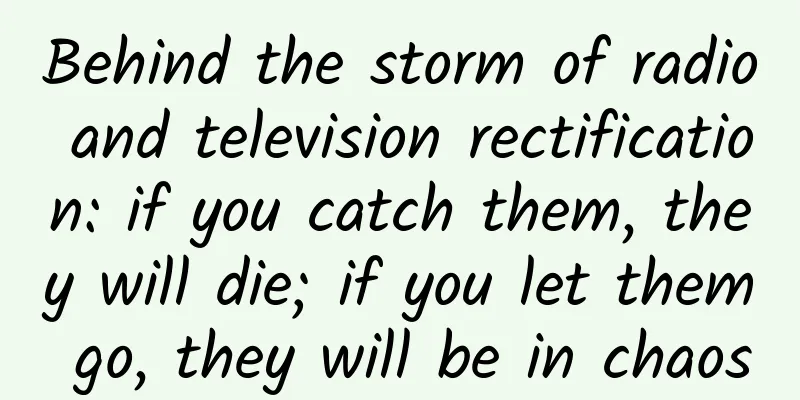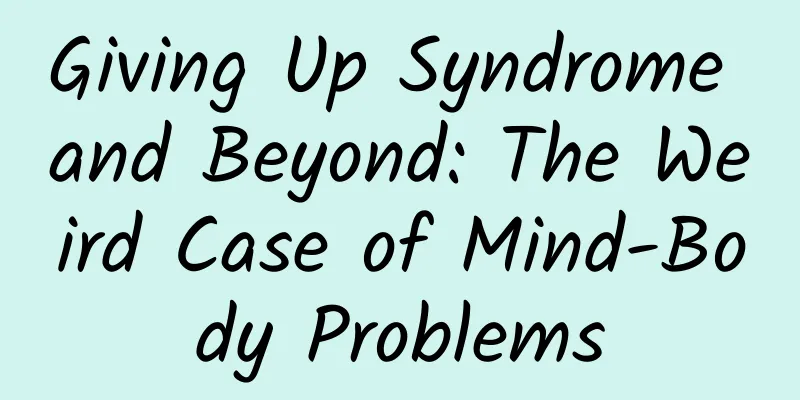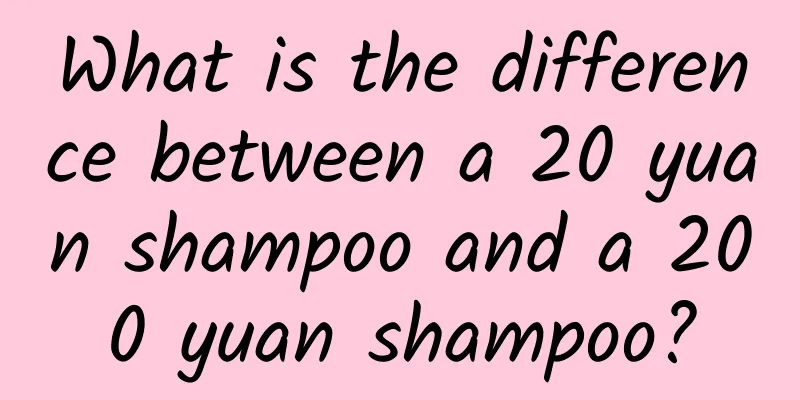Behind the storm of radio and television rectification: if you catch them, they will die; if you let them go, they will be in chaos

|
Recently, Tencent Video officially announced that "in response to the policy requirements of the radio and television, the TV version of Tencent Video will be suspended." So far, the radio and television's rectification of the OTT industry has extended from the broadcast control platform, APP functions, and UI system to the TV version of the video website. Rectify the license dealers: if you catch them, they will die; if you let them go, they will become chaotic Dating back to the beginning of the rise of the Internet TV industry, the State Administration of Radio, Film and Television failed to provide effective guidance or control. It was not until the entire industry began to develop in an disorderly manner that the State Administration of Radio, Film and Television suddenly woke up and began to adopt an industry management model of controlling the licensees. With the rise of OTT terminals, especially the proliferation of counterfeit TV boxes, some licensees have illegally provided content with unclear or even no copyright on the broadcast control platform in order to seek cooperation with Internet video companies that have a lot of resources. This has angered the radio and television industry, which has begun to rectify the licensees that they once had high hopes for. In the entire Internet TV industry chain, the position of licensees is embarrassing. Initially, the radio and television handed over the broadcast control power to the licensees, which seemed to be a decentralization, but in fact it was hoped that the licensees would control the content market of the entire Internet TV industry. However, just like the embarrassment faced by administrative management in almost all other industries, "death if controlled, chaos if released" is the true portrayal of the current broadcast control platform of licensees. Future TV is one of the licensees that was recently criticized by the Radio and Television Administration. The Radio and Television Administration accused it of violating regulations by cooperating with Internet companies such as Xiaomi and LeTV. Future TV can be said to be the most favored of the seven major licensees. However, if there is any chaos in the development of the Internet TV industry, Future TV will become the target of being "killed" in a minute. Being sandwiched between broadcasters and content providers, OTT terminal manufacturers, etc., license holders have never had an easy time. Rectification of OTT enterprises: Those who follow me will prosper, those who go against me will perish If the purpose of SARFT's screening of the content on broadcast control platforms is to make the market environment more orderly, and it does help providers of legitimate content resources reduce the risk of their resources being stolen and broadcast illegally, then in the recent series of rectification measures, the constraints and regulations on OTT companies by SARFT have become increasingly "inhumane": blocking the live TV and on-demand functions in almost all Internet TV terminals; blocking third-party video applications and download channels in TV box app stores; blocking browser applications and download channels in smart TVs and TV boxes; determining that the self-developed UI of OTT manufacturers launched by non-broadcast control platforms is in violation of regulations; and announcing the closure of the TV version of the video website. With the rapid development of the Internet TV industry in recent years, industry norms are in urgent need of being established. The State Administration of Radio, Film and Television, which was supposed to supervise, guide and promote the industry through licensees, has recently been eager to appear in the foreground, playing the role of a domineering commander and referee, and fully demonstrating its usual superb skills of "treating the symptoms instead of the cause". Harming user experience: Do we really want to go back to the days before liberation? Compared with the State Administration of Radio, Film and Television or licensees, OTT manufacturers, which are closer to users in the industry, obviously attach more importance to user experience. Attracting home users who have been diverted by smart mobile devices in recent years to return to the big screen of TV is a goal that smart TV manufacturers, TV box companies, Internet content providers and developers hope to achieve. Some companies with a keen sense of smell have even begun to plan and develop more application values behind smart TVs, such as large-screen games and TV shopping. Is "attracting home users to return to the big screen" also the goal of radio and television? Perhaps. A series of rectifications can prevent the emergence of unhealthy content and make the Internet TV platform free from chaos. However, the simple "one-size-fits-all" approach has caused the user experience to gradually decline, and users have complained repeatedly. Frankly speaking, the development of the Internet TV industry has indeed exceeded people's expectations. Both the speed and technology have exceeded the expectations of the competent authority, the Radio and Television Administration. How to face the difficulties brought about by the new market form and the rapid development of technology may not be answered in a short time. Traditional services and new technologies, DVB and OTT, are by no means a black-and-white binary. Even the Radio and Television Administration itself has proposed to "embrace the integration of DVB+OTT." However, for a long time, the "actual attack" on OTT has been regarded as a means for the Radio and Television Administration to protect its own son, DVB, a traditional key business. Ironically, the increase and decrease in key data such as the power-on rate of DVB and OTT in recent years also indicates that this "protective attack" is doomed to fail. Whether the series of rectification policies made for Internet TV companies in the past year have really standardized the development of the industry or have restricted its development, the actual effect still needs time to be verified. As for now, after multiple rounds of rectification storms, the industry generally believes that no matter whether it is licensees, content resource providers, OTT or Internet TV manufacturers, or the audience in front of the screen, no one can become a winner in this "losing game". As a winner of Toutiao's Qingyun Plan and Baijiahao's Bai+ Plan, the 2019 Baidu Digital Author of the Year, the Baijiahao's Most Popular Author in the Technology Field, the 2019 Sogou Technology and Culture Author, and the 2021 Baijiahao Quarterly Influential Creator, he has won many awards, including the 2013 Sohu Best Industry Media Person, the 2015 China New Media Entrepreneurship Competition Beijing Third Place, the 2015 Guangmang Experience Award, the 2015 China New Media Entrepreneurship Competition Finals Third Place, and the 2018 Baidu Dynamic Annual Powerful Celebrity. |
<<: CCTV reports that barrage movies have gone from subculture to mainstream
>>: IQIYI's online film festival goes to Venice, Youku may fall behind
Recommend
What is the difference between Baidu and Google?
Recently, Baidu CEO Robin Li personally answered ...
5 marketing strategy ideas to build a brand with lasting competitiveness
Whether it is as small as a promotional activity ...
From online to offline, advertising budgets continue to decline!
Well-known self-media complained in the circle of...
Industrial robots, human assistants or anxiety-generating machines?
The rapid development of the Internet has made th...
Which day's class will be made up on April 2, 2022? What day of the week was the class? Attached is the latest holiday schedule for Qingming Festival!
Soon, we will be welcoming the Qingming Festival ...
The dream of a minimalist smartphone is beautiful, but the reality is bleak
On July 1, Wired published an article saying that...
The termination of IPO guidance is just a warning. Dong Mingzhu's bet on Yinlong was destined to be an endless gamble.
On May 30, the Guangdong Securities Regulatory Bu...
How can the education industry improve overall customer acquisition results?
China's education industry is entering a gold...
Why is it that no one is interested in the product even though we have exhausted all kinds of marketing methods?
I have learned all kinds of clever marketing tech...
What is Baidu Wenku promotion? How to promote Baidu Wenku?
Document libraries are a major way to spread info...
Before we even start eating the hot pot, some people are already arguing over it! Is the foam on the surface the essence or the dirt? Should we skim it off?
The temperature drops sharply, and it is a great ...
Four national departments jointly issued a document, stating that these examinations in hospitals will no longer need to be repeated!
Four national departments jointly issued a docume...
3 factors that affect product promotion and conversion (Part 2)
Many adjustments seem simple, but the leverage ef...
The method of increasing users by “old customers bringing in new customers”!
Before talking about the method of “old employees...









